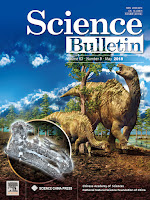 |
| Bayannurosaurus perfectus
Xu, Tan, Gao, Bao, Yin, Guo, Wang, Tan, Zhang & Xing, 2018
|
Abstract
A presumably mostly quadrupedal ankylopollexian iguanodontian, Bayannurosaurus perfectus gen. et sp. nov., is reported here, and is represented by an excellently well-preserved skeleton from the Lower Cretaceous Bayingebi Formation of Inner Mongolia, China. The diagnosis of the taxon includes several autapomorphies, notably a dorsally directed, strap-like posterodorsal process of the jugal and a horizontally oriented preacetabular process of the ilium. The nearly complete caudal series retains eight posterior-most caudals with procoelous, trapezoidal centra in dorsal view, and the last three caudals are fully fused. The discovery of B. perfectus opens a critical new window on the early evolution and intercontinental dispersal of Iguanodontia. The skeleton displays a transitional morphology between non-hadrosauriform ankylopollexians and Hadrosauriformes. A phylogenetic analysis indicates that Bayannurosaurus is positioned higher on the tree than Hypselospinus, but below Ouranosaurus just outside of Hadrosauriformes. The tree topology of Iguanodontia with temporal and spatial constraints reveals a possible biogeographic scenario supported by the statistical dispersal-vicariance analysis: around the J/K boundary, non-hadrosauriform ankylopollexians experienced multiple dispersal events from Europe to Asia, accompanying the coeval fall of the global sea level.
Keywords: Non-hadrosauriform ankylopollexian; Lower Cretaceous; Bayingebi Formation; Inner Mongolia; Intercontinental dispersal
Systematic palaeontology
Ornithischia Seeley, 1887
Ornithopoda Marsh, 1881
Iguanodontia Dollo, 1888 sensu Sereno, 1998
Ankylopollexia Sereno, 1986 sensu Sereno, 1998
Bayannurosaurus perfectus gen. et sp. nov.
Etymology: ‘Bayannur’, the name of the general geographic area where the fossil was retrieved; ‘saurus’, based on the Greek word ‘sauros’ for lizard. ‘perfectus’, in reference to the perfect preservation of the skeleton designated as the holotypic specimen.
Holotype: IMMNH PV00001 (housed at the Inner Mongolia Museum of Natural History, Hohhot, Inner Mongolia), a nearly complete, semi-articulated skeleton, including the entire caudal series.
Locality and horizon: Chulumiao, ∼7 km north of Chaogewenduer Town, Urad Rear Banner, Bayannur, Inner Mongolia (Fig. 1b); middle part of the upper half of the Bayingebi Formation (Fig. 1c); Early Cretaceous (early Aptian).
Xing Xu, Qingwei Tan, Yilong Gao, Zhiqiang Bao, Zhigang Yin, Bin Guo, Junyou Wang, Lin Tan, Yuguang Zhang and Hai Xing. 2018. A Large-sized Basal Ankylopollexian from East Asia, Shedding Light on early Biogeographic History of Iguanodontia. Science Bulletin. 63(9); 556-563. DOI: 10.1016/j.scib.2018.03.016
Iguanodontia is among the first-discovered dinosaurian groups in the world, and has become one of the best studied ornithischian clades, which refers to its taxonomic, phylogenetic and ontogenetic significance for dinosaurian evolution. Ankylopollexia represents a relatively derived iguanodontian clade that displays large body size and many highly modified features for more efficient herbivory and locomotion. Although relevant studies on European and North American material enhanced our knowledge of the early evolution of Ankylopollexia, the extreme scarcity of non-hadrosauriform ankylopollexians in Asia had long hindered attempts to comprehensively elucidate evolutionary history and related issues of the global iguanodontians. The research team led by Dr. Xing Xu names and describes a new non-hadrosauriform ankylopollexian Bayannurosaurus perfectus represented by an excellently wellpreserved skeleton, from the Lower Cretaceous Bayingebi Formation, western Inner Mongolia, China. The discovery of this new taxon is very helpful in understanding the origin and early evolution of Hadrosauriformes, optimizing the phylogenetic framework of non-hadrosaurid iguanodontians and clarifying the global biogeographic history of Iguanodontia around the Jurassic–Cretaceous boundary (see the article by Xing Xu et al. on page 556).


